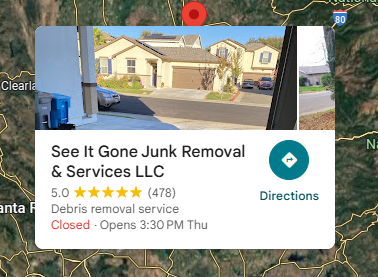Junk Removal Impact on Urban Neighborhood Cleanliness
Estate cleanouts are more than just removing clutter—they are an emotional and practical process that helps transform grief into clarity.
Marysville, CA, United States, 16th Oct 2025 – In the hush of emptied hallways and behind the creak of a door that once welcomed generations, lies the untold weight of letting go. An estate cleanout is not merely the act of discarding clutter or hauling away old belongings; it’s an emotional crossroads, a practical necessity, and a symbolic release all at once. Whether you’re settling the affairs of a lost loved one, preparing to sell a family home, or simply clearing the remnants of a long chapter, the importance of a thorough estate cleanout cannot be overstated. The process, often underestimated, holds the power to transform grief into clarity and chaos into calm.
It’s a task that demands more than just muscle and garbage bags. It calls for sensitivity, planning, time, and often—help from seasoned professionals who know how to do more than just remove objects. They help carry the emotional weight, too, indirectly allowing individuals and families to begin their next steps untethered by physical reminders of the past. While it’s tempting to approach an estate cleanout like any other cleaning job, this endeavor requires a completely different mindset. It’s about transition. And how smoothly that transition happens may hinge entirely on how the cleanout is handled from the start.
The Emotional Undertow: What Lingers in the Corners
There’s something hauntingly poetic about rooms filled with personal effects after a life has ended or a chapter has closed. Dusty bookshelves, untouched wardrobes, aged photographs—all holding silent witness to stories now past. These aren’t just items; they’re relics of memory. And that’s precisely why estate cleanouts often catch people off-guard emotionally.
Many individuals begin the process thinking it will be a simple task—sort, donate, toss, sell. But each drawer holds echoes, each closet conceals a dozen moments that might pull at the heart unexpectedly. It’s not uncommon for someone to halt mid-cleanout, overwhelmed by nostalgia, guilt, or even uncertainty about what to do next. In this way, the cleanout process becomes more than an act of organization—it becomes a form of grief work. But here’s the truth: avoiding the cleanout prolongs the pain. Items linger, decisions stall, and so does closure. Facing the mess, the memories, the magnitude of it all head-on may not feel easy, but it’s vital. It’s the bridge between what was and what will be. And the sooner it’s crossed, the more peace can be found on the other side.

Time Is a Cruel Negotiator
There is rarely a perfect moment to tackle an estate cleanout. Time, indifferent to our emotions, presses forward. Maybe there’s a looming property sale, a deadline to vacate, or rising costs associated with storage. Whatever the urgency, there’s often an invisible clock ticking. Waiting too long can complicate matters—emotionally, legally, and financially.
Paperwork gets misplaced. Valuable items may deteriorate or be stolen in vacant homes. Utility bills continue to stack. And meanwhile, the property remains in a limbo of both memory and marketability. Delay breeds complication. Even if the initial emotional burden feels too heavy, initiating a structured cleanout provides momentum. And momentum, more often than not, carries you through to completion before you even realize you’ve made progress.
Dismantling a Life, Piece by Piece
It’s an uncomfortable reality: when someone passes or moves away permanently, what’s left behind must be addressed. That process is intricate, delicate, and full of decisions. Not everything has value—monetary or sentimental. And not everything can be kept. You’ll find yourself facing items that raise more questions than answers. Should this old watch be passed down, or is it better donated? Is there someone who wants the sewing machine? What about that stack of paperwork from two decades ago—does it matter anymore?
Every piece of an estate, from vintage china sets to yellowing newspapers, has to go somewhere. Estate cleanouts force us to make these decisions efficiently. And unless you have unlimited time and emotional bandwidth, assistance is crucial. Not because you can’t handle it—but because you shouldn’t have to do it alone.
Clearing the Path for Future Ownership
Once the sentimental fog clears and logistics take over, a cleanout’s true function becomes evident: preparation. Whether the goal is to rent, sell, or repurpose the property, it must be cleared, cleaned, and made ready for what’s next. Potential buyers or tenants aren’t just looking at a house—they’re imagining their lives in it. And that vision is harder to form when old furniture blocks walkways and closets are stuffed with remnants of another person’s story.
A clean space is a blank slate. It invites opportunity, signaling readiness for what comes next. The faster an estate is professionally cleaned out, the sooner the home can become viable for its next purpose. This isn’t just about appeal—it’s about functionality. No realtor or renovator wants to work around heaps of belongings. And neither should you.
Hidden Hazards in Emotional Hoarding
Not all belongings are harmless. Some are outright dangerous. Over the years, homes become unwitting repositories for forgotten chemicals, expired medicines, moldy boxes, insect nests, and structural hazards hidden beneath heaps of accumulation. Estate cleanouts, particularly in older or unmaintained homes, may unearth surprises best handled by professionals.
What looks like an innocent pile of magazines might conceal mildew. That box in the garage? Could be leaking batteries. And basements or attics might be compromised with insulation problems, animal droppings, or worse. Approaching these tasks without the right tools, knowledge, or protection isn’t just ill-advised—it can be dangerous.
Proper estate cleanout teams are trained not just to remove items, but to assess safety risks, protect the home’s structure, and ensure environmental regulations are met when disposing of certain waste. You don’t want to discover asbestos or a broken gas line mid-DIY attempt.
An Efficient Approach to Sorting and Disposing
The logistics of a cleanout resemble a complicated puzzle. There are recyclables, donations, resale-worthy goods, bulk waste, confidential documents, and potentially hazardous materials. Knowing what to do with each pile requires more than common sense—it requires experience. Paper shredding, electronic recycling, large item disposal, furniture donation coordination—all must be sorted fast, with as little second-guessing as possible. Efficiency is key. The more streamlined the sorting, the faster the space becomes functional again.
But sorting isn’t just physical. There’s also the emotional triage—determining which sentimental items are genuinely meaningful and which are holding you back. Many people fall into the trap of keeping “just in case” items that eventually end up in their own garages, creating generational clutter. A good estate cleanout process prevents this ripple effect.
Avoiding Family Conflict Through Third-Party Neutrality
Estate transitions, especially those triggered by the loss of a loved one, can spark familial disagreements. Siblings may argue over heirlooms. Cousins might bicker over perceived entitlements. What starts as a cleanout can spiral into drama that poisons family ties.
Introducing an impartial, outside party into the process—someone whose only goal is to assist—can defuse this tension. It creates a structured framework, removes the emotion from the logistical aspects, and establishes a pace that keeps everyone on track. You’re less likely to argue about who’s doing more or who’s taking too long when a professional is handling the bulk of the effort. This doesn’t mean the family is excluded from the decision-making process. It simply means that the burden is redistributed, leaving loved ones more room to grieve, remember, and eventually, heal.
Preserving the Past Without Drowning in It
Preservation doesn’t mean hoarding. Nor does it mean abandoning everything to the landfill. A well-managed estate cleanout includes identifying valuable memorabilia, organizing keepsakes for family distribution, and responsibly donating items that no longer serve their original purpose. It’s possible to honor the past without being buried under its weight. One photo album carefully stored is worth more than twenty random boxes of unsorted paper. One cherished antique, cleaned and placed in a new home, carries more emotional resonance than a dusty attic full of forgotten trinkets.
Through estate cleanouts, people rediscover the importance of intentionality. What do you truly want to hold onto? What deserves space in your life going forward? These are the questions that matter. A cleanout isn’t just a cleaning job—it’s a philosophical journey wrapped in boxes, tape, and a thousand decisions.
The Psychological Payoff of Letting Go
Once the last box is removed, the last bag hauled away, and the property stands empty—something strange and beautiful happens. Relief. Not just the physical kind, but emotional release. The air feels lighter. The space breathes again. So do you. Grief doesn’t vanish, but it moves. It stops sitting like a boulder in the chest and becomes something more manageable, something integrated. That psychological freedom—achieved through action, choice, and courage—is perhaps the greatest reward of a proper estate cleanout. It transforms obligation into empowerment. You’ve not only honored the past but cleared a way forward.
This transition is life-affirming. It’s closure by way of clarity. And that, more than anything else, is why estate cleanouts are indispensable. Not because things must be thrown away, but because lives must keep moving.
Conclusion
Estate cleanouts are rarely easy, but they are necessary. Whether you’re managing the aftermath of a loved one’s passing or preparing a home for resale, the process demands care, attention, and a steady hand. When approached thoughtfully, a cleanout becomes more than a task—it becomes a profound step toward healing, renewal, and forward motion. For residents in and around Marysville, CA, compassionate and comprehensive cleanout support is just a call or email away. Reach out to See It Gone Junk Removal for estate cleanout services that are handled with both respect and precision. Phone: 530-328-3872 | Email: seeitgone.junk@gmail.com
See It Gone Junk Removal & Services LLC
810 Toddwick Ave Marysville California 95901
(530)845-1270
https://seeitgonejunkremoval.com/
Company Details
Organization: See It Gone Junk Removal & Services LLC
Contact Person: See It Gone Junk Removal & Services LLC
Website: https://seeitgonejunkremoval.com/
Email: Send Email
Contact Number: +15308451270
Address: 810 Toddwick Ave Marysville California 95901
City: Marysville
State: CA
Country: United States
Release Id: 16102535489

